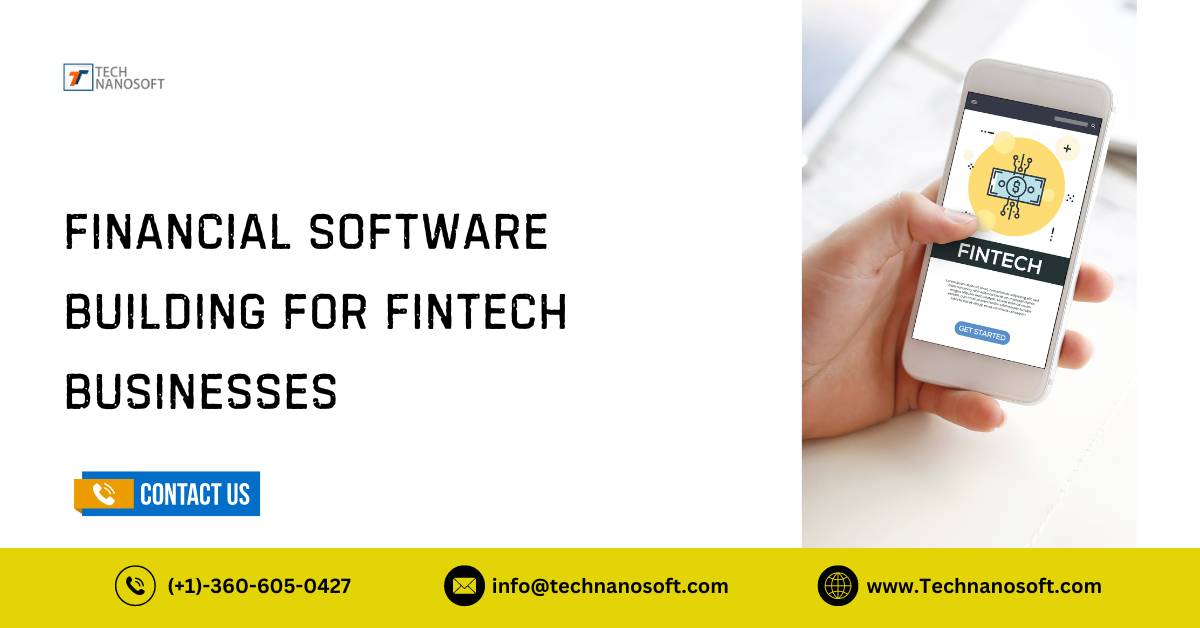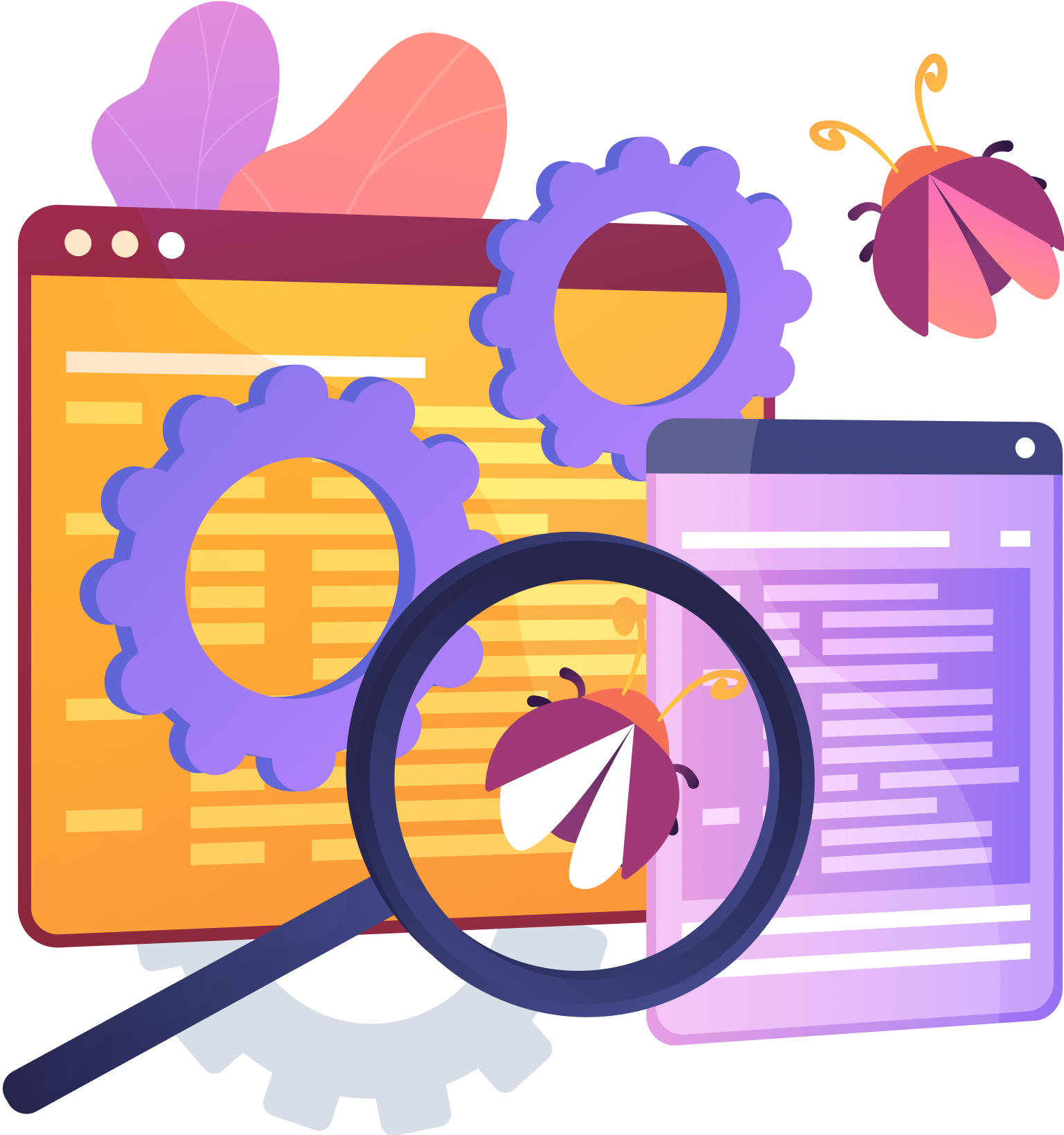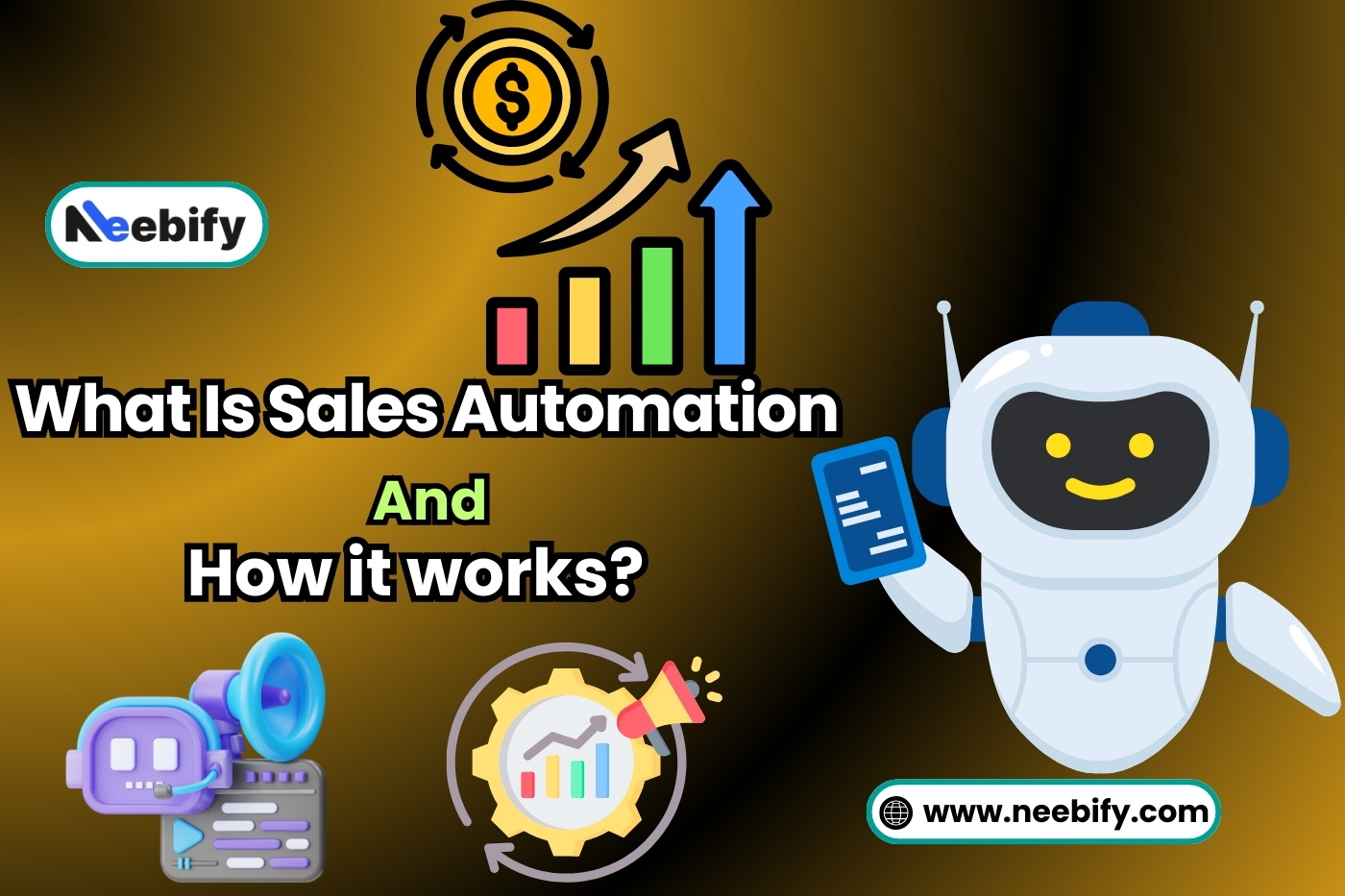Financial Software Building for FinTech Businesses

In this fast-paced digital age, making financial software has changed the way the finance business works. Companies are starting to see how much their efforts in developing fintech apps have paid off, and fintech marketing is growing very quickly. This article talks about the field of financial software development.
It talks about what financial software development is, why fintech banking is so popular right now, the benefits of investing in the creation of fintech apps, important things to think about, the role that fintech apps play in the growth of businesses, the steps needed to make fintech apps, the money needed, and how to choose the best development company.
What is Fintech?
Fintech an acronym for fintech technology represents a dynamic blend of finance and technology that is transforming the way individuals and businesses handle their finances. Fintech's new solutions are revolutionizing traditional financial services, making them easier to use, more efficient, and more accessible than ever before.
Fintech is experiencing unprecedented growth thanks to cutting-edge technologies like ai in fintech, blockchain, and cloud computing. Fintech companies utilize these technologies to create mobile payment apps, robo-advisors, and digital banking platforms that cater to the unique requirements of both consumers and businesses.
Fintech makes it easy for people to do business, manage their investments, and access banking services from their phones or computers. By streamlining processes, lowering costs, and getting rid of barriers to entry, fintech promotes financial inclusion and gives everyone access to financial services around the world.
Whether it's peer-to-peer lending, automated investing, or insurance technology (insurtech), fintech is continuing to change and improve many areas of the financial industry. As the fintech ecosystem grows, it creates new opportunities for collaboration, innovation, and financial empowerment. This will make the future of finance more efficient, accessible, and focused on the user.
Types of Financial Software
Software For Accounting
Accounting software changes the way businesses handle their money by providing a wide range of tools that make financial tasks easier. These platforms automate tasks like payroll management, billing, and expense tracking, which saves time and cuts down on mistakes. They also give businesses information about their cash flow, profitability, and overall financial health through customizable reports and dashboards.
Software For Banking
Banking software is a key part of modernizing banking operations and making the customer experience better. By digitizing traditional banking services, these platforms make it easy for customers to access their accounts, make transactions, and apply for loans from any device. Advanced security measures, like encryption and multi-factor authentication, keep sensitive financial data safe.
Software For Keeping Track of Investment Portfolios
Investors can confidently reach their financial goals with investment portfolio management software. These platforms use complex algorithms and analytics to give users information about market trends, asset performance, and portfolio risk exposure. Professionals use advanced features such as scenario analysis and portfolio optimization to build diversified portfolios that meet their clients' goals and risk tolerance.
Software For Trading
Traders and investors can take advantage of market opportunities quickly and accurately with trading software. Advanced trading platforms provide many tools, such as charting, technical analysis, and algorithmic trading, to help traders make smart decisions and put their strategies into action. Traders can make trades quickly and efficiently with direct market access and low-latency execution, which increases profits and lowers risks.
Software For Managing Your Own Money
Personal finance software gives people the tools they need to take charge of their finances and reach their long-term goals. These programs have all the tools they need for budgeting, tracking expenses, setting goals, and managing debt, so users can get a full picture of their financial health. Personal finance software makes managing money easier by having simple, easy-to-understand interfaces and interactive dashboards that let users keep track of their spending habits.
The Rise of Fintech Banking
Fintech banking, also called digital banking or neobanking, is the provision of banking services through digital platforms and technology-driven solutions. Unlike traditional banks, fintech banking institutions are completely online and offer services like savings accounts, payment processing, lending, and wealth management through mobile apps or web interfaces. Fintech banking employs digital platforms and technology-driven solutions.
Techniques For Making Your Financial Software and System Successful
Internet of Things (IoT)
Adding Internet of Things (IoT) technology to financial software lets many devices and sensors connect and talk to each other, which makes it easier to collect and analyze data in real time. By automating tasks such as asset tracking, inventory management, and maintenance forecasting, IoT enhances the accuracy and efficiency of financial systems. By using IoT, financial software can give useful insights, make operations run more smoothly, and help people make better decisions.
AR/VR (Augmented Reality and Virtual Reality)
AR and VR technologies create immersive and interactive experiences that can make financial software easier to use and more interesting. AR adds digital information on top of the user's real environment, letting them see financial data or play out different investment scenarios. VR creates virtual worlds that users can explore, making it possible for interactive financial education or virtual meetings.
Blockchain
Blockchain technology powers smart contracts, ensuring the automatic execution of predefined agreements without the need for intermediaries. In the world of financial software, smart contracts make transactions safe and clear, lowering the risk of fraud and error. These self-executing contracts enforce terms and conditions coded into the blockchain, which makes sure that transactions are trustworthy.
Bots
In fintech, bots, also referred to as chatbots or AI, are computer programs that mimic human speech through the use of artificial intelligence and natural language processing. In the context of financial software, bots can help customers, answer questions, and make transactions through messaging platforms or voice interfaces. By using bots, financial institutions can give customers more personalized help, automate routine tasks, and make it easier for people to use their services.
Voice-enabled Payments
Voice-enabled payments use voice recognition technology to let users start and confirm financial transactions by speaking. Users can easily make payments, check their balances, or transfer funds verbally when voice-enabled payment systems connect to virtual assistants like Apple's Siri or Amazon's Alexa. By adding voice-enabled payments to financial software, businesses can meet the growing demand for hands-free transactions.
Blockchain and Smart Contracts
Finance apps are using blockchain technology more and more to make transactions safer and more open. The distributed ledger system of blockchain enables the unchangeable recording of transactions. Smart contracts, a fundamental component of blockchain platforms such as Ethereum, autonomously execute contracts according to pre-established conditions. This cuts out the need for middlemen and increases trust in transactions.
Cloud Computing
Cloud computing has become an important part of the infrastructure of finance apps because it offers scalability, redundancy, and low cost. By using cloud services from platforms like Amazon Web Services (AWS), Microsoft Azure, or Google Cloud Platform, finance apps can access a reliable and scalable infrastructure without having to buy hardware up front. Cloud computing also lets finance apps handle changing workloads, making sure that everything runs smoothly.
Benefits of Developing Fintech Applications
Low Cost
Fintech applications are revolutionizing the financial industry by providing new ways to run businesses more efficiently and significantly lower costs. By automating repetitive tasks, improving workflows, and getting rid of the need for physical infrastructure, fintech companies can pass these savings on to customers, making financial services more affordable. This cost-effectiveness not only helps businesses by increasing their bottom line, but it also helps customers by lowering their costs.
More customer Satisfaction
In today's competitive financial world, customer satisfaction is key, and fintech apps are great at making this happen. By putting user experience and personalization first, fintech companies create interfaces and interactions that are easy for customers to use and enjoy. These apps use data-driven insights and predictive analytics to predict users' needs, make relevant suggestions, and deliver custom solutions, which leads to deeper engagement.
Better security
It's important for both businesses and consumers in the financial sector to feel safe online because cyber threats and data breaches are becoming more common. Fintech applications protect users and sensitive financial data by using cutting-edge security methods like end-to-end encryption, biometric authentication, and real-time fraud detection. By doing this, fintech companies build trust and confidence in their platforms, making them safer overall.
Capacity To Outperform Rivals
Fintech companies are able to beat traditional competitors by focusing on innovation, being flexible, and putting the customer first. By having a culture of continuous improvement and being open to trying out new technologies, fintech companies can quickly adapt to changing market conditions and customer tastes, staying ahead of the curve and beating competitors. Fintech companies set themselves apart from competitors by providing better products, services, and user experiences.
Handling Various Financial Requirements
One of the best things about fintech apps is that they can handle a wide range of different financial needs. Fintech platforms provide comprehensive solutions tailored to each user's needs and preferences, whether it's budgeting, lending, banking, or investment management. Fintech platforms achieve this by offering customizable features, user-friendly interfaces, and seamless integration with various financial products and services.
Difficulties and Risks
While creating fintech apps offers numerous advantages, it also presents various risks and challenges that require effective management. The biggest of these is making sure that strong data security measures are in place to keep private financial data safe from cyber threats and breaches. Another big problem for fintech developers is keeping up with changing laws and regulations.
Important Elements of Fintech Growth
UI/UX
A user-friendly interface is at the heart of fintech development. It's what makes banking experiences smooth. We use intuitive design principles and prioritize the user to create interfaces that simplify complex financial tasks.
This lets users easily move around in the digital world. We carefully design every aspect, from sleek screens to easy-to-use navigation menus, to make it easier to use and encourage engagement, ensuring users don't feel overwhelmed by the power of financial technology.
Safe Payment Processing
When it comes to fintech growth, safety and security are very important, especially when it comes to processing payments. Strong encryption protocols, multi-factor authentication, and PCI compliance are the building blocks of secure payment processing systems. These features give users trust and keep their financial transactions safe from fraud or unauthorized access. When fintech apps put data security and privacy first, they make the internet a safe place where people can do business without worrying about possible threats to their sensitive financial information.
Instantaneous Data Access
In the fast-paced world of finance, being able to see facts in real time is very helpful for making smart choices. Users of fintech apps can get instant access to financial information, market trends, and performance analytics thanks to cutting-edge technologies.
Up-to-date information allows users to stay ahead of the curve, enabling them to take advantage of opportunities and mitigate risks in real-time, whether they are monitoring investment portfolios or transaction histories. Fintech apps give everyone equal access to data, which gives users the power to confidently and clearly plan their financial futures.
Data Analytics
Data is what makes financial innovations possible. It provides insights that help businesses grow and keep users interested. Comprehensive data analytics features let fintech apps gather, process, and make sense of huge amounts of financial data, finding useful insights that help with making strategic decisions and improving products.
From behavioral segmentation to predictive analytics, data-driven insights help fintech companies personalize user experiences, improve product offers, and predict market trends. This helps them be successful and last in the competitive financial world.
Easy Integration with Other Financial Systems
In the fintech ecosystem, connectivity is very important. When one banking system works with other systems, it makes everything work better and more useful. Open APIs, interoperable protocols, and middleware solutions make it easy for fintech apps and external systems to share data and work together.
This lets users use services and functions that support each other in a single ecosystem. Connecting to other financial systems easily improves the user experience and opens up new ways to collaborate and come up with new ideas. This is true whether the link is for cross-platform transactions or collecting financial data from different sources.
Scalability and Cross-platform Compatibility
Scalability and cross-platform flexibility are important for future-proofing innovation and making room for growth in the fintech world, which is always changing. We need to build fintech apps on scalable designs that can accommodate an increase in users, transactions, and features without compromising the app's reliability.
Cross-platform compatibility also makes sure that financial solutions work well on a variety of devices and operating systems, meeting the needs of users on web, mobile, and new platforms. Fintech developers can make sure that their apps stay flexible, adaptable, and useful in a market that is changing all the time by accepting scalability and cross-platform compatibility.
READ ALSO - Top Cash Advance Apps Like Cleo | App Features
Fintech App Development Stages
Ideation
Ideation is the spark that starts new ways of solving financial problems in the fast-paced world of fintech innovation. Fintech leaders come up with new ideas that users like by working together to brainstorm and doing a lot of research on the market. This phase isn't just about coming up with ideas; it's also about coming up with unique value propositions that set the app apart from similar ones on the market.
From figuring out the needs of niche markets to picturing technologies that will change the way we do things, ideation sets the stage for the journey that will change everything. Each idea has the potential to completely change how we handle our money.
Market Analysis
Market research is the map that helps fintech businesses find their way through the complicated world of competition and how people act. Market research gives us important information about how things will develop by looking closely at user preferences, competitor products, and rules and regulations.
To understand new trends, you need to do more than just follow the crowd. You also need to find unmet wants and untapped opportunities. Fintech innovators can fine-tune their strategies and make their app a beacon of relevance and resonance in a constantly changing if they have a lot of market data.
Design and Prototyping
Design and testing are the craftsmen in the field of fintech who turn rough ideas into amazing user experiences. By focusing on the user, designers carefully create interfaces that help people move through the financial environment. Designers meticulously plan every pixel and contact to ensure the site's ease of use and navigation.
Prototypes enable the realization of ideas, enabling all stakeholders to perceive the future of banking with clarity and conviction. This phase, which includes wireframes and interactive mockups, is the perfect example of how creativity and functionality can work together to create a truly transformative user experience.
Development
Development, the process of turning ideas into lines of code, is the foundation of fintech innovation. A group of experienced developers works together to bring design ideas to life, building complex systems that keep the financial economy running.
We carefully write every line of code to ensure security, scalability, and speed, from the robust backend infrastructure to the seamless API integrations. As the fintech app's digital backbone takes shape, developers follow best practices to keep user data and transactions safe. This builds trust and reliability in a world that is becoming more and more linked.
Testing
Fintech developers transform new ideas into reliable solutions through testing. Developers carefully check every aspect of the app's features, speed, and ease of use using strict methods such as unit testing and user acceptance testing. We carefully find, rank, and fix bugs and problems to ensure a flawless user experience when the app launches.
Testing does more than just make sure the app works. It also makes sure it can handle real-life situations, which strengthens its roots against the unknowns of the digital world. Not only do we fix bugs, but we also build trust and faith in the power of fintech to change things.
Launching
Launching an app is the last step in the process of making a financial app. This is where dreams become real. With a well-planned rollout strategy, stakeholders can handle the challenges of deployment, making sure that the change from development to delivery goes smoothly. We meticulously plan every step to ensure the app's maximum visibility and accessibility, from listing it in app stores to establishing the server infrastructure.
After the app goes live, it will have ongoing support and monitoring systems to make sure it works well in the rough digital market. This will solidify the app's position as a leader in innovation in the constantly changing world of finance.
How Can Technanosoft Help You Make Fintech Software?
Technanosoft is the best company to work with if you want to make your financial dreams come true. Custom financial solutions tailored to your specific needs are our specialty. at navigating regulatory systems because we have a lot of experience in the fintech field. This gives you peace of mind and compliance.
Using cutting-edge technologies like artificial intelligence and blockchain, we create solutions that are not only new but also strong, safe, and scalable. In addition, our skilled team makes sure that all of our products work well with banking systems and third-party APIs, which improves efficiency and interoperability. Put your trust in Technanosoft to transform your fintech software development idea into a reality, enabling unprecedented growth and success for your business.
FAQs about a Fintech App
Q.1- what are fintechs app?
A- fintech app is a mobile app that uses technology to offer financial services like banking, investing, planning, and making payments.
Q.2- In what ways does your banking app help people?
A- fintech app has many features, such as a safe way to join in, managing your account, keeping track of your transactions, making a budget, managing your investment portfolio, paying your bills, and making payments on the go.
Q.3- Is the information I give you about my finances safe?
A- Yes, the safety of your banking information is very important. app follows best practices in the industry and uses strong encryption methods to keep your data safe from people who shouldn't have access to it.
Q.4- Can I use more than one device to log in to my account?
A- App is made to work on multiple platforms, so you can access your account from phones, laptops, and computers, giving you more options and making things easier for you.
Q.5- How can I begin using your fintech app?
A- It's simple to use our financial app for the first time. You can get the app from the App Store or the Google Play Store, make an account, and then follow the steps on the screen to set up your identity and connect your accounts.
Q.6- What kind of customer support do you offer?
A- customer service team is here to help you with any questions or problems you may have. You can reach support team by email, phone, or live chat, and they'll be happy to help you and fix any problems quickly.
Q.7- Are there any fees associated with using your fintech app?
A- Use of app may cost money for some services or activities. We do try to be clear about any fees, though, and give you all the information you need about prices and charges right away.
Q.8- Can I customize alerts and notifications on your app?
A- Yes, you can change how alerts and messages work in our app to suit your needs. You can stay on top of your funds by setting up alerts for account activity, transactions, bill due dates, and more.
Q.9- What information do I need to provide during the Fintech login process?
A- To log in to our fintech platform, you will typically need to provide your registered email address or username and your password. Some platforms may also require additional verification steps, such as two-factor authentication, to enhance security.









